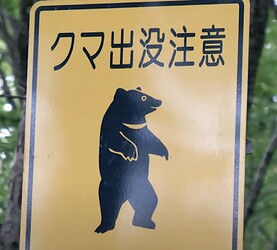Just to be sure, しょう is the on’yomi. But yeah, it sounds like a useful word!
Words learned on the day of my test:
- 竣工(しゅんこう)completion of construction
- 執り行う(とりおこなう)to hold a ceremony
- 基幹(きかん)key (as in “key industry”)
For the kun’yomi reading (しょう is on’yomi as Jona said) my go-to is 消しゴム, because I use it everyday, usually can’t find it, cause it ends up under my study materials and I exclaim loudly when looking for 消しゴムくん ![]() .
.
EDIT:
Words for today:
獣の数字 - number of the beast (yes, that one!)
状況報告 - progress report
状況判断 - situational awareness
好況 - prosperity, healthy economy
出没 = making frequent appearances; appearing often
(level 52 in WK)
おむつ nappy
I’ve just had a baby and use this word a lot in English, so thought it would be valuable to know in Japanese as well!
And diaper, for the Americans ![]()
⠀
ポツリ :
- isolated; standing alone
- falling in drops (e.g. rain)
- saying a single word; muttering just a few words⠀
Can also be written as ポツン - not sure if it’s related to 点 ![]()
Everyone posts such cool esoteric words, but I’m here with a simple one I would imagine most already know: 偉い (えらい). I’m starting to branch out into beginner native material bit by bit, and I’m taking the usual route of reading Yotsubato early. It’s really cute!
As for the word, it came up early, and was unfamiliar. At first I guessed it would be related to 選ぶ (えらぶ), which, as you can guess, I only really know by sound. Seems that was totally mistaken, but I’m still glad I remembered it, because that was a recent Genki word.
The word means great, excellent, etc, but it’s second definition (on jisho) is awful or terrible. There are a bunch of opposite-meaning words in Japanese… though I’ve been thinking about how bad can mean good in English, so I guess people just like to do that.
The word is sticking with me unusually well, like it’s just lodged in my brain from the first moment I saw it, so that’s the only reason I felt compelled to post it here. I’ll take those freebies wherever I get them.
孤独死 = dying alone
I got this word when watching a drama. It seems like it is a common issue in Japan.
Haha yeah I thought about that after I posted and thought, “Nahhhh they can figure it out” ![]()
Today’s words are sponsored by the kanji 寝, because apparently 寝不足:
寝不足 - lack of sleep (〜不足 - lack of something)
寝室 - bedroom
寝言 - sleep-talking (not a する compound, though ![]() )
)
寝具 - bedding (sheets, etc.)
寝台 - bed
But also:
失踪(する)- disappearance
失踪者 - missing person
成績書 - transcript of records
成績表 - report card
EDIT:
I just realized 寝不足 is actually a WaniKani item, because it came up in a review ![]() .
.
Some more words:
貝紫色 - royal (tyrian!) purple
貝毒 - shellfish poisoning
貝細工 - shell crafting (making stuff out of shells)
Pretty clear who failed to Burn their 貝, eh? ![]()
I was telling a friend I learned 薬方 on WK this week and she said she mostly uses 処方箋(しょほうせん, medical prescription). She also taught me two other words:
- 頓服薬 (とんぷくやく) dose of medicine to be taken only once (I find this word very specific
 )
) - 薬包(やくほう)paper for wrapping powdered medicine (also very specific)
Some random finds:
細菌 - bacterium, germ (was looking for 最近 to check some nuance, but…)
アジト - hideout, safe house (interesting etymology, heard it today while watching ERASED)
語り手 - narrator
煌めく - to sparkle, to twinkle (f.e. きらめく星 - twinkling star)
なす術もない・なすすべもない - Being desperate
突飛・とっぴ・Extravagant, ridiculous
一つ一つ - one by one (the second 一つ is pronounced びとつ, but somehow my IME doesn’t pick that up)
〜に連れて - somewhere between 〜ながら and 〜てから; assumes the following clause B happens only when/as preceding clause A happens, but A and B are more or less simultaneous
想定内 - within expectations
想定外 - beyond expectations (both good if 想定 is a leech for you as well)
段々 - gradually
キラキラ(する) - twinkling
チカチカ(する)- flickering, flashing
有り触れた〜 - ordinary, mundane (works as a past tense 〜した adverb, similarly to 大した)
外務省 - ministry of foreign affairs
内務省 - interior ministry
and some 〜出す compounds:
吹き出す - to gush out
叫び出す - to shout out, to let out a cry
Corrected 一つ一つ. Thanks @Lahoje !
I’ve never heard that before. Where’d you get that from?
怪人二十面相 by Edogawa Ranpo: かいじん二十めんそう
Had to run this through Weblio, though: 「一つ一つ」の英語・英語例文・英語表現 - Weblio和英辞書
“ひとつひとつ” only generates 30,000,000 (thirty million) or so results on Google,
meanwhile “ひとつびとつ” shows a whole 22,800 (twenty-two thousand)!
Could be a typo or artistic liberty of the author then? The びとつ does look fishy if the IME can’t pick it up. That’s usually a red flag.
We are reading the same book!! It reminds me that I wasn’t sure about the sentence ”余がいかなる人物であるかは、貴下も新聞紙上にてご承知であろう" so I asked my friend about it →
余は私、貴下はあなたって意味!
「私がどんな人物であるかは、あなたも新聞を通じて知っていることでしょう。」

